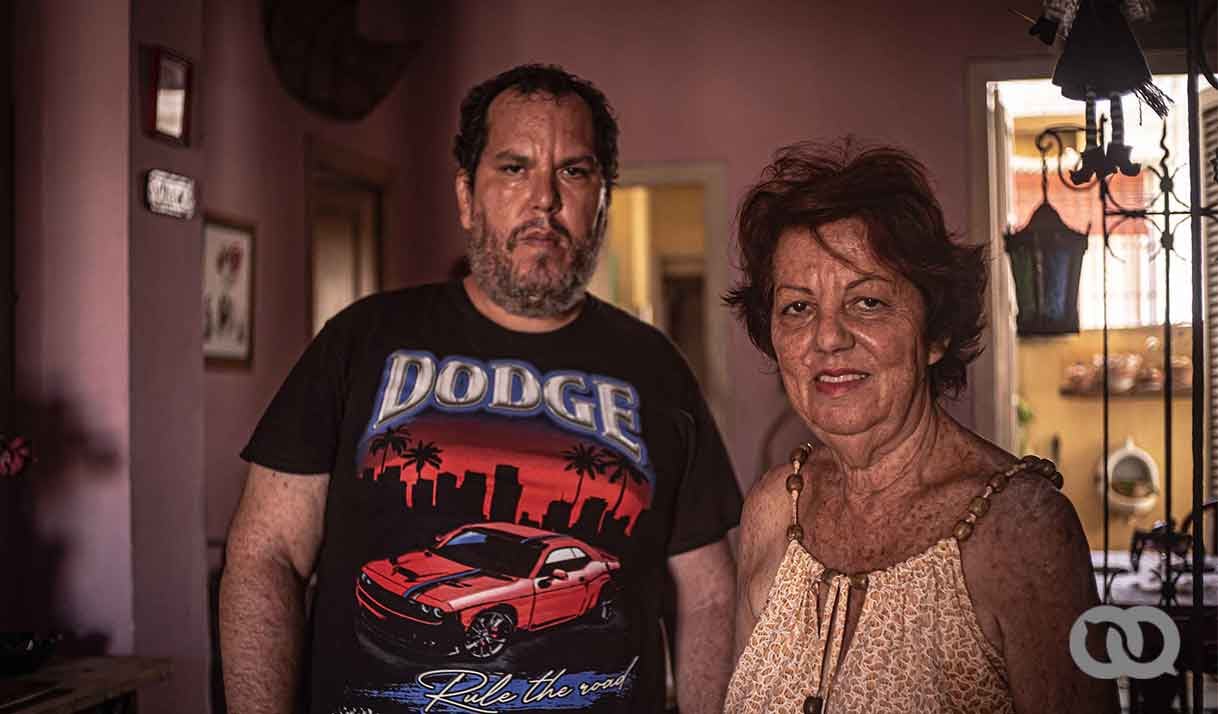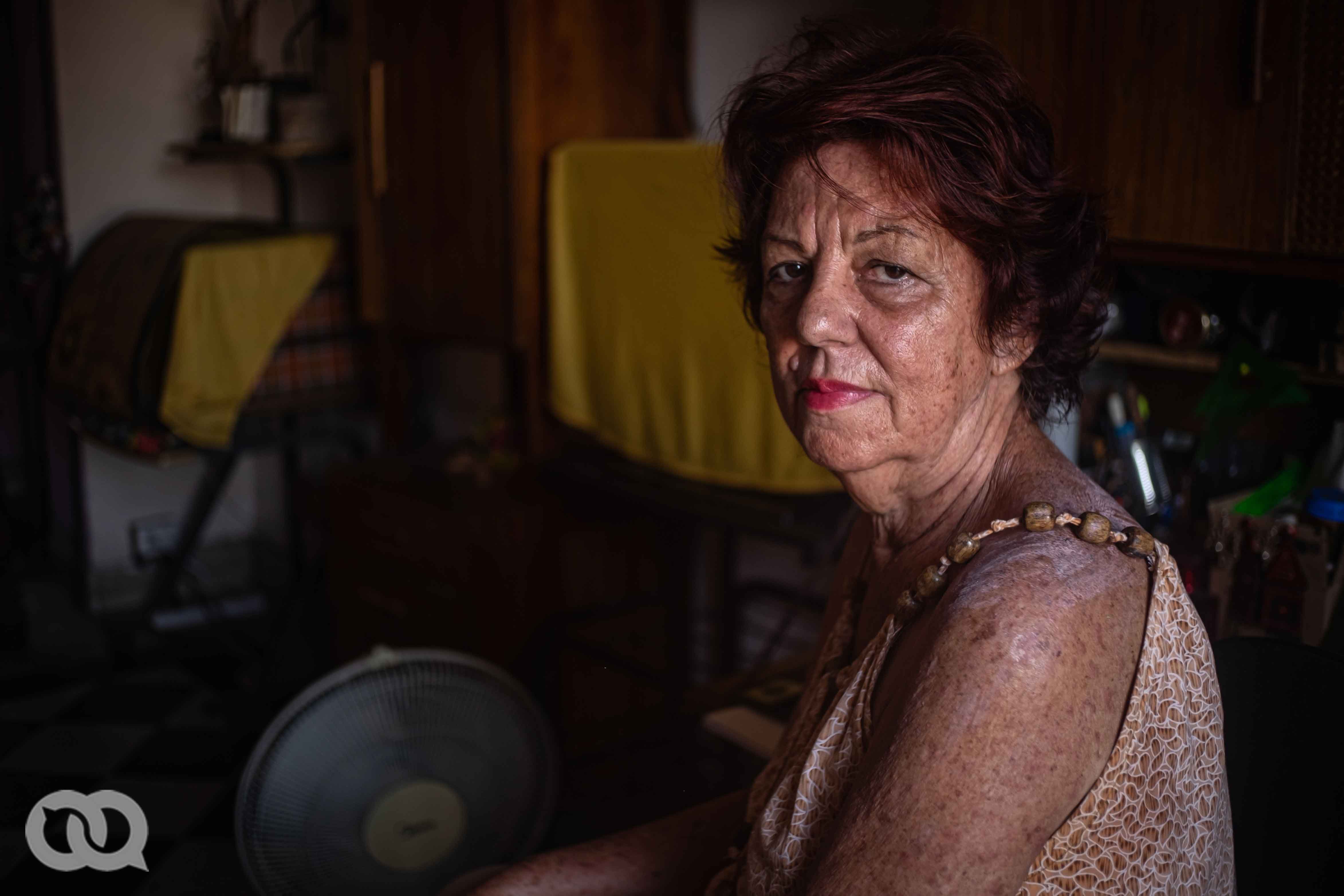
Given the lack of mental health attention for her son, Cari let out a scream of frustration on social media. People heard her, but there was no happy ending.
Cubans Worn Out by the Scarcity of Psychiatric Resources
17 / noviembre / 2023
Maria Caridad Castillo Palau, “Cari” as she’s affectionately known, arises very early each morning to seek “some option” for her 39-year-old son Allen, who refuses to take his pills without something to accompany them with. Taking advantage of the fact that he likes to sleep late, she goes out to buy provisions. She crosses half of Havana, she says, but almost always ends at the market on 17th and K streets, because it’s the “cheapest.”
“If he’s awake when I return, he’s asking for something to eat, so then I make lunch. He lies back down, but a little while later – when not even an hour and a half has elapsed – he’s asking for a snack. If I don’t give him a snack, it’s a tragedy. In that case, he keeps after me all the time,” Caridad admits. We’re talking in her living room, amid the loud street noises of Havana’s San Lazaro neighborhood.
The sound of the cars and the traffic mixes with the Raggaeton music their downstairs neighbor is playing at full volume. The afternoon sun shines directly onto a table where Caridad – a native of Camaguey and an architect by profession – is working on some handicrafts she hopes to sell in the next small business fair.

“It wasn’t always this way,” she assures.
Before he fell sick, Allen was a much more active young man; he helped at home and did the errands. Diagnosed with cognitive delays, he managed to get as far as ninth grade, and he worked for over a decade in the Central Sterilizing Department of the University Pediatric Hospital in central Havana. He was considered an outstanding employee there.
He also liked making handicrafts. He worked in clay and painted. He regularly attended special workshops that were offered on weekends. There, he brought to life a character that he baptized Jaidu, a figure that took on different faces and expressions and appears in various of his artistic works.


But everything changed when his boss began to “make life impossible for him.”
“That affected him greatly,” states his mother, now 74. “He took on the job of checking his backpack, to make sure no one had put anything in there and later accuse him of having stolen something. That’s where everything unraveled.”
After a strong crisis during a family trip to Cienfuegos in 2019, Allen began to exhibit strange behaviors, like talking to himself, and also some aggression. In the end, he was diagnosed with the dual condition of paranoid schizophrenia and cognitive difficulties.
For nearly two years, he spent more time in the “General Calixto Garcia” University Hospital than at home, because he was rejecting nearly all the medications they were giving him. The specialists tried different combinations, until they came up with the current formula – a mixture of Seroquel, Amantadine, Chlorpromazine, and Clonazepam – the only one that has had a positive effect. However, it’s been months since the last three drugs can be found in the Havana pharmacies, forcing Caridad to obtain them on the informal market at inflated prices, or to exchange them with some friends.

Cari proudly displays her son Allen’s drawings.
Since they laid him off five years ago, Allen feels he no longer has to work. He relies on Cari for everything, or nearly everything. He doesn’t throw out the garbage, or go look for bread like before. He asks his mother to stretch the sheets to make his bed because he can’t.
During the pandemic, Allen’s situation was still more complicated. He would escape and leave the house without his mask on. During those years, Cari’s husband, Hector, was still alive and would help her comb the neighborhood for him. Hector passed away in November 2022.
On several occasions, the family took Allen to urgent care at the “Calixto Garcia” Hospital, but the waiting room was always packed with Covid-19 cases. They would bring him there for just a “little moment” to get the shots he needed, then return home immediately.

The “ration card” for his Clonazepam reflects the irregularity in its supply.
Allen’s case became known in March 2023, when his mother called Cuba’s Comprehensive System for Medical Emergencies (SIUM), following an intense week in which Allen was in extremely poor shape, even to the point of pushing Cari out of the house.
“They told me there was only one ambulance and that it wasn’t used for such cases. I called the Police. The Police told me that they couldn’t act without the SIUM. And what was I supposed to do then? Begin screaming in the middle of the street?” Caridad says. “So then a person said: ‘Don’t scream, put it on Facebook.’”
Cari then went ahead and denounced on social media the collapse of the psychiatric institutions and the lack of available beds.
“I’m a retired mother on a pension that doesn’t even stretch far enough to buy fruits for him to take his medicine with. (…) The health system isn’t fulfilling its function; it’s not assuming its responsibility in a country where being a psychiatric patient shouldn’t surprise anyone,” she wrote. “I’m worn out going to social workers, the Public Health System and the pertinent government institutions, where they’re very attentive, but don’t solve the problem.”
After posting this, she was contacted by several groups and individuals. Above all, mothers who tried to help her with other pharmaceutical drugs. Among them was a Havana doctor who called herself Tania. The doctor arranged an ambulance, and his admission into the Havana Psychiatric Hospital, because the specialized ward at the “Calixto Garcia” was being repaired. There, Cari says, mother and son spent six terrible days. Cari went almost without eating, because the only food stand nearby only sold jam, and her wallet “wasn’t up to that.”
On two occasions, she had to sneak out and go home to look for food and two of Allen’s medications, because they didn’t have any in the hospital. On the ward where they placed Allen, there were five people who wandered. She recalls that these patients spent the whole day tied up and screaming. One of them even tried to attack her son.
“I had the medications. The message I posted was because I wanted to evaluate whether those medicines were no longer affecting him. But such an evaluation wasn’t possible there (…) After six days, the hospital released him.”

Cari shows the prescriptions she hasn’t been able to fill, because none of the medications are available.
After Allen got out, an activist from the Huella project contacted the Psycho-pedagogical Medical Center known as “La Castellana” whose mission is to offer attention and social assistance to people with disabilities. They underwent a series of evaluations, but they couldn’t keep Allen as a resident there because, according to their explanation, they didn’t have the capacity. Allen could have attended the workshops they offered there, but there weren’t any spaces left to transport him.
Cari asserts that she’s still “fighting” for Allen to be accepted in that residential center because, although she appears to be a strong person, she’s coming up on 75 years and dealing with her own health problems.
“I had a stroke a few years ago. I have problems with my memory, and I have my neurological treatment. So, I don’t know what moment could be my last, and I don’t know what will happen to him (…) I can’t satisfy all his needs, because I don’t have the resources. I get some help – I can’t say I don’t – but that assistance doesn’t cover everything I spend.”

Allen is completely dependent on his mother.
Caridad retired a few years ago when Allen’s father got sick, but even though she’d like to, she hasn’t been able to go back to work. Allen’s current condition won’t let her. Before her son’s illness, sometimes she did some outside jobs on weekends, or accepted some work she could do from home, especially related to the problems of homes in poor shape. With that, she earned a little extra money. But everything changed radically when Allen’s condition worsened.
“I get some possible offers of work, but I can’t accept them because I can’t leave him alone for a long time,” Cari laments.
What will the future be like for Cari and Allen? “Very bad,” the mother affirms. With the psychiatric hospitals undergoing repairs, and she as Allen’s only caregiver, she doesn’t see much light at the end of the tunnel.
This article was translated into English from the original in Spanish.









comments
We moderate comments on this site. If you want to know more details, read our Privacy Policy
Your email address will not be published. Mandatory fields are marked with *